This week, World Press Freedom Day highlighted the plight of foreign journalists who put life and liberty on the line. But while reporters in New Zealand don’t often face the threat of jail or death, that doesn’t mean the media's freedom is guaranteed.
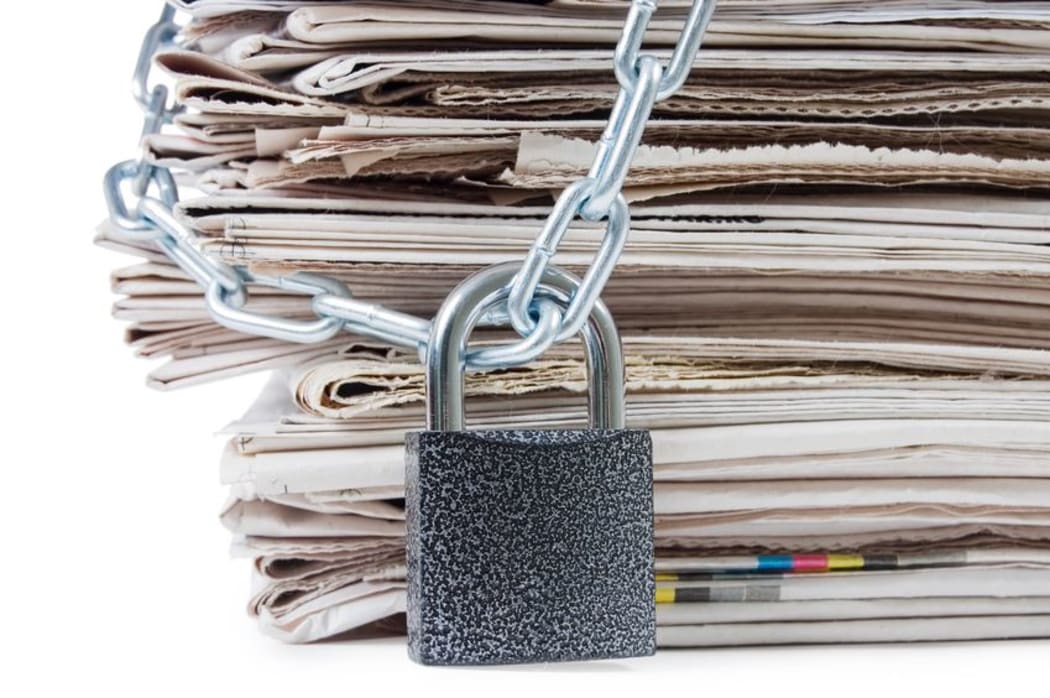
Photo: 123RF
On Thursday, politicians argued with each other in the pub across the road from Parliament - nothing new in that.
But this was an annual event with a difference: a freewheeling debate to help journalists by raising money for the families of those murdered overseas. The money raised this year will go to the Philippines and Nepal.
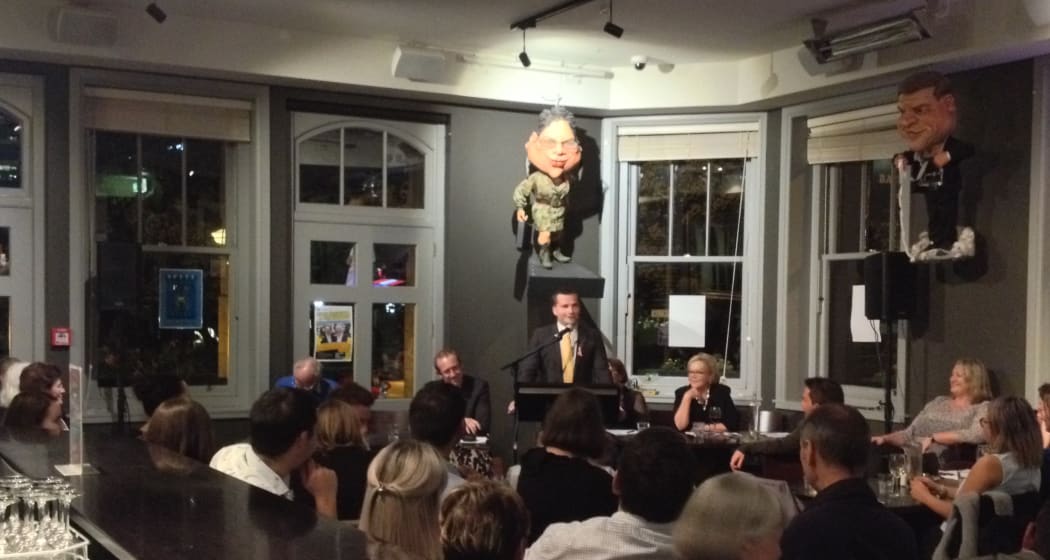
MP David Seymour speaks during the 2016 Media Freedom debate fundraiser. Photo: RNZ / Mediawatch
Across the Tasman, the journalists' union - The Media, Entertainment and Arts Alliance (MEAA) - published a report into the state of press freedom in Australia.
Criminalising the Truth, Suppressing the Right to Know said Australia now has a raft of national security laws that could criminalise legitimate journalism and prosecute whistleblowers.
Some government agencies could now trawl through journalists’ telecommunications data, and jail journalists for reporting matters deemed to be of national security, the report said.
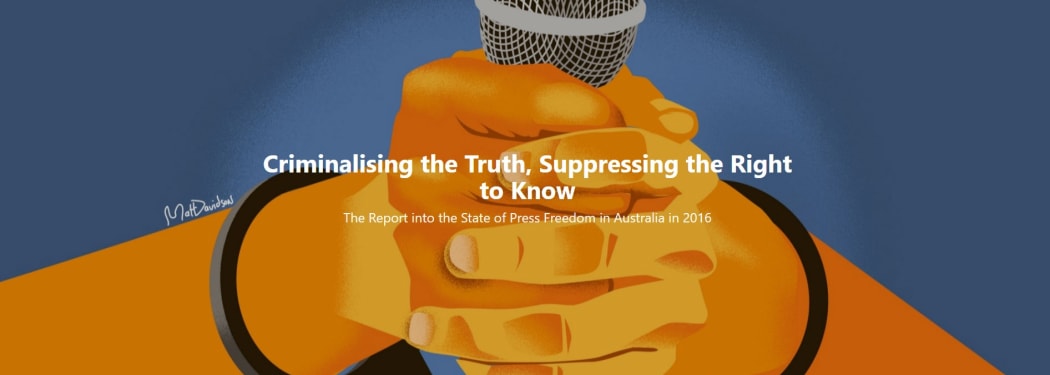
Photo: supplied / MEAA
“Australia was once a bastion of press freedom and freedom of expression but now Australian governments are pursuing journalists and their sources," MEAA chief executive Paul Murphy said.
"There is a great deal of effort being expended by government to avoid legitimate scrutiny. And it’s getting worse".
Warnings for New Zealand
On World Press Freedom Day in 2013, Australia’s Reporters Without Borders representative Mark Pearson warned we should be wary of threats to media freedom, even though New Zealand had just appeared in the top ten of its annual press freedom index.
Metadata tracking was becoming routine, CCTV more widespread and smartphones were doubling as “self-surveillance devices” for unwary journalists working on sensitive stories, he warned.
In New Zealand, all this seemed a bit of a distant threat at the time, but a scoop published shortly before ended up showing us it wasn't.
When Fairfax Media political reporter Andrea Vance revealed dozens of New Zealanders were illegally spied upon by the GCSB, an investigation ordered by the prime minister’s office asked for details of her movements around Parliament and her phone calls from her office. Parliamentary Services handed it over.
She’s not the only journalist to have felt the heavy hand of a state agency intrusion, though some journalists pushed back in 2015.
The New Zealand Defence Force (NZDF) reached a settlement with freelance foreign correspondent Jon Stephenson - and apologised to him - after he sued for defamation. A 2011 statement had effectively claimed part of an eye-opening Metro magazine report on what our troops were doing by Mr Stephenson had been made up.
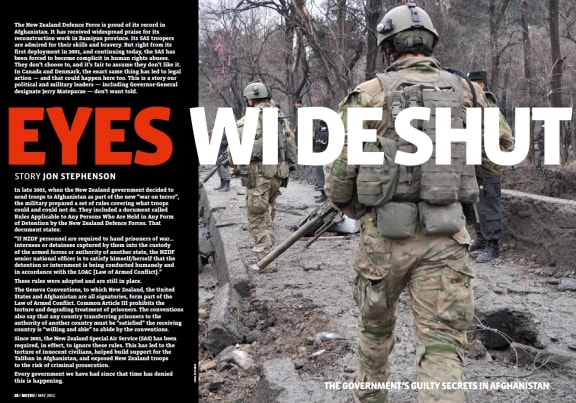
Jon Stephenson's Metro magazine article which was contested by the NZDF Photo: supplied
When the case got to court, the NZDF admitted their press statement was wrong. The jury couldn’t agree on a verdict and the defamation trial was abandoned, but the NZDF only settled when another trial was imminent, with the risk of an award of significant damages.
The cost of justice for journalists
The New Zealand Herald later used the Official Information Act to reveal that hundreds of thousands of dollars of public money had been spent defending the case - not including the confidential sum of the settlement - even though their position was so weak. Defence defending the indefensible, you could say.
Another freelancer also won a settlement last year after suing Prime Minister John Key for defamation. Mr Key accused camera operator Bradley Ambrose of News of the World-style tactics when his microphone recorded the so-called 'Teapot Tape' in the run up to the 2014 election.
The PM called in police to investigate. Police executed search warrants in several newsrooms in a bid to find the recording.
While these cases were wins for journalists in the end, both dragged on for more than two years. As the agreed settlements were confidential, New Zealanders will never know the full cost to the public. And, unlike Mr Key and the NZDF, the journalists who had to go to court to defend their professional reputation could not dip into the public purse.
Calling in the cops
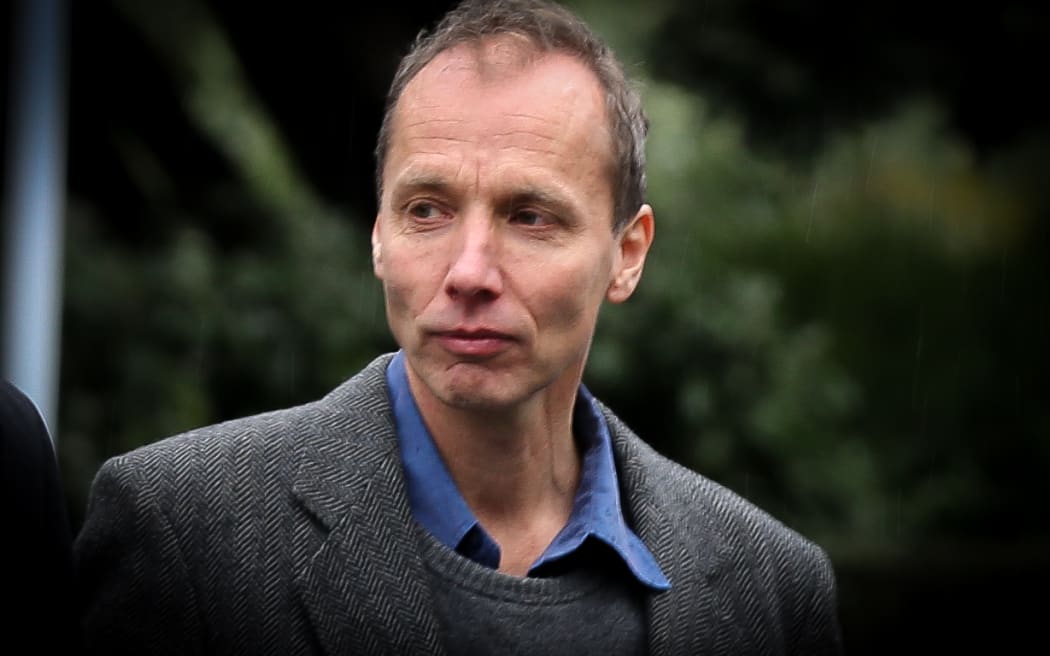
Photo: RNZ / Alexander Robertson
This year, independent journalist Nicky Hager also won a legal battle after police raided his home.
His explosive book Dirty Politics was based on hacked private email and social media messages of New Zealand’s leading attack bloggers, Cameron Slater. Police responded swiftly and strongly to Mr Slater's complaint about the hacked data.
Even though Mr Hager was only classed as a witness at the time - and not a suspect - his papers, computers, and other devices belonging to him and his daughter were seized in a 10-hour raid carried out in his absence.
The raid swept up confidential information relating to Mr Hager’s other investigations, but nothing relating to Mr Slater’s complaint. His computers were cloned, and during the judicial review of the raid, the court heard they were accessed in spite of assurances they wouldn’t be.
Police investigators even asked several companies including Google and Air New Zealand for Mr Hager’s personal data. In the absence of a warrant, they all declined the police request, with the exception of Westpac bank which handed over details of Mr Hager’s transactions.
Eventually a judge ruled the police raid was unlawful. The seized property was returned to Mr Hager and copies of his electronic data were destroyed in his presence. Legal action against the Police and Westpac is ongoing.
Dirty Politics also revealed the issue of the Official Information Act (OIA) being manipulated.
Mr Hager set out cases of information of genuine public interest being withheld for political purposes, and some instances where information damaging to political opponents was released rapidly.
Obstructing official information
Journalist Megan Hunt researched the ‘gaming’ of the OIA and found it ran from the prime minister's office right down to a small regional health board.
“It is naïve to expect everyone using the OIA will follow the rules all the time, however Kiwis should never give up pushing for the accountability and transparency the legislation embodies,” she said.
When Mr Key candidly admitted his ministers sometimes choose to release information when it suited them, the Chief Ombudsman ordered a review of compliance.
Journalists were disappointed when he found no clear evidence of manipulation by ministers or public servants. But incoming Chief Ombudsman Peter Boshier recently said he was “putting government agencies on notice” and promised to publish tables ranking the time it took ministries to respond to requests.
“We’ll be assessing this in a very clinical fashion ... and I’ll be fairly robust about this," he said.
Journalists will be hoping he lives up to his promise.
Media freedom isn't just for journalists
The president of New Zealand’s Association of Scientists warned last year that a proposed code of conduct covering state-employed scientists commenting on issues in the media could amount to a gag. A survey of its members had already revealed concern about the constraints, risks, and disincentives scientists faced in relation to speaking publicly, especially on sensitive issues which may involve political or commercial interests.

Jarrod Gilbert Photo: University of Canterbury
Last November, the police apologised to sociologist Dr Jarrod Gilbert after he was banned from accessing data critical to his research on gangs. The police deemed him unfit to conduct research because of his "affiliations" with gangs.
This also revealed a contract which had to be signed by all academics wanting access to police data. It gave officers the power to challenge research which showed "negative results" and even the power to veto publication.
Police have since said that contract will be changed to protect the independence of academic research.
It’s interesting what a little exposure in the media can achieve, once someone asks the right question or blows the whistle loudly enough.
This article is an edited version of Press Freedom in New Zealand, Colin Peacock's contribution to the Criminalising the Truth, Suppressing the Right to Know

